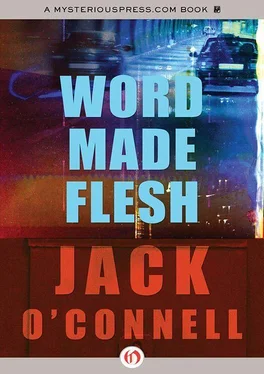That might not have been much to go on, but it made you need me in a persistent way. And at the risk of sounding like a romance novel, a love grew out of it. We do not choose our motivations. They choose us.
Except for the occasional sound of a page being turned or the body shifting slightly, Lacazze could easily forget that Gilrein is in the backseat.
How did Langer do it? How did the old man focus on his narrative and drive at the same time? How was he able to maneuver the taxi through its routes while his brain was fully immersed in another world?
The Inspector knows that the cab must come to a stop in order for him to finally tell his own story. The distractions of the passing city are just too great. He can’t inhabit the past and the present at the same time. The strain would be unbearable. Perhaps this is another symptom of the Grippe, an effect no one talks about because there are so many others that are more dramatic.
There is simply so much to see on the street tonight. And all of it appears so vibrant. Almost hyperreal. Even the scrap yards up on Cornell Hill. Even the deserted section of the Vacuum. Everything has a vibration tonight. Everything seems to be calling out for attention, sending a warning that means I am significant, I am an integral part of the picture.
But it isn’t until he finds himself steering the hack past the Yusupov Garden Room, then cross-cutting alleys until he’s passing the Hotel Adrianople, that Lacazze understands there has been an underlying plan to his journey, a system born of his subconscious or the strictures of karma. Either way, he’s been taking himself and his passenger on a haphazard, sometimes backward tour, a memorial parade that retraces a historic procession, a trip that once led, in the end, to the Rome Avenue Raid.
And now I think, my love, that you were instinctively correct. My laugh was born not out of insensitivity to another’s tradition (though, of course, there was that). Not out of a moment of social stupidity (though there was certainly a degree of that). My laugh came for the exact reason you sensed at the beginning: because I could not understand the meaning of your need. I could not understand how a seemingly intelligent young man could have so much vested in such an illogical and obviously symbolic ritual. I could not understand that it went beyond ritual, that it was attached to the center of how we view and then live our lives, of how we view the reason for our existence. And ultimately and simply, of how we define and deal with the agents of good. And maybe more important, of evil.
I was laughing at a young man who had wanted, more desperately than I could imagine or understand, to believe that there was purpose and order and meaning beyond himself, beyond his own making.
Please try to understand this, Gilrein: I was laughing because, whether I knew it or not, I was terrified.
It has taken me the span of our marriage to realize this. The truth is unalterable. I laughed out of fear. Tonight’s epiphany says that my intellect could be boundless and it still would not be enough. I can reject Mystery, but that will never negate Mystery. You have converted me with your presence, Gilrein. I am still an atheist as I know you to understand that term. But I am less and less an egotist. By the time you wake up, I’ll be humbled to my core.
Now I find that as a philosopher, I am a coward. As a linguist, I am made blind and deaf by my own ego and pride. And as a cop, I am sinfully envious of the criminal.
I loved you because in the end, you could not be a monster even when you thought you needed to be a monster. I have loved you because you have given me, without a price, the perfect life in the bungalow, where Mystery came to live, where improbable and fragile hope could be born to the sad accompaniment of a perfect-voiced torch diva.
My mentor believes that language creates reality.
My mentor now calls his Methodology “The Final Criticism.”
My mentor could not be a bigger asshole if he practiced on Saturdays.
I have so much to tell you, Gilrein. There is so much I don’t know. But so much that I suspect. I am tempted to wake you right now. But I’m already late to meet the Inspector. Yet another hot tip regarding the Tung. So I’m off to Hotel Adrianople. You sleep now and we will talk forever when I return. As Imogene would say,
We will talk until
Every story has been told.
The cab bumps up and over the curb and jerks to a stop. The engine dies by way of a stall. Gilrein looks up to find himself in front of the Dunot Precinct House. In the quiet, the shallow and labored breathing from the front seat is more pronounced, the soundtrack to a movie about disease.
“You don’t like the noise,” Lacazze says.
“Does anyone?”
“Mr. Gilrein, there is a whole breed of people in love with death. This city is lousy with death lovers.”
“I wouldn’t know about that.”
The Inspector tries to clear his throat and fails. “Do you carry a gun?” he asks.
Gilrein pulls his.38, holds it up for Lacazze to see.
“Bring it inside,” the Inspector says. “One of us may need it.”
Gilrein looks in the mirror and says, “I’m not going inside.”
“I think you are, Mr. Gilrein,” Lacazze says, without annoyance. “I think you want to come inside.”
The old priest climbs out onto the sidewalk, fumbling with the flap on his breast pocket, finally pulling free a Magdalena and launching into a new search for his lighter.
Gilrein watches him through the window and says, “That’s just what I want to do,” with as much cruelty as he can manage, “spend the rest of the night in a small room with a man in the last phase of the Grippe.”
The Inspector comes up with a pack of matches and with a little difficulty ignites the end of the cigar. Gilrein wonders how he can sustain a draw with the trouble he has breathing, but in moments the barrel end of the stogie is glowing and the air is filling up with a heavy, woody smell.
Lacazze holds the Magdalena like some fragile musical instrument and through the smoke he says, “Do you know what I think the Grippe really is, Gilrein? It’s a parasite. Genetically manipulated but completely organic. It’s a microscopic vermin. Enlarged, I think it would look like a tiny worm. Transferred by the spray of spittle when one has a simple conversation. ‘How about this weather?’ and you’re infected. It crawls through the brain, relatively harmless until it meets the language centers. It lays its eggs as soon as it lands and it immediately starts feeding. Quite insatiable during pregnancy. Gestation is just forty days. The eggs hatch and the offspring join the picnic. That is when you know something is horribly wrong. You can’t find the correct word. Or you can’t find the graphical symbols to represent that word. Any hope of communicating is torn away. Any hope of meaning is devoured. Thank God it’s ultimately fatal.”
He pauses to take a long draw on the cigar and then adds, “I don’t think you could care less about the Grippe, young man. I think you might welcome a chance to contract the Grippe. Such a romantic way to go. Not as dramatic as a shower of bullets, but surely more lingering. A longer period of suffering.”
“You have to be a smug prick right to the end?”
Lacazze taps some ash to the sidewalk.
“You mistake insight for arrogance, Mr. Gilrein. But you’ll follow me inside anyway. Not really for the contagion, however. That’s just a bonus for you. You’ll follow me because I knew Ceil better than you did. And you can’t bear that. After all this time. You want to know what I know.”
Gilrein throws his door open and goes after the old priest, grabbing him by the lapels and running him up against the bricks of the station house. Lacazze doesn’t struggle, just goes limp, lets himself be carried by the force of the attack, eyes open the whole time and staring at Gilrein.
Читать дальше












